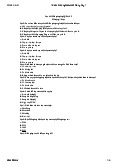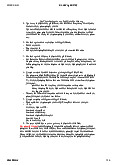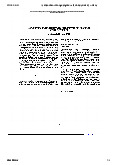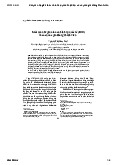




Preview text:
21:37 1/8/24
The Foreign Policy Angle in India
The Foreign Policy Angle in India’s Upcoming National Elections
The BJP has consistently used its foreign policy credentials to bolster its domestic
popularity, but the difference is mostly one of style rather than substance. ByArvind Mohan January24,2024
It is traditional wisdom to argue that foreign policy is anegligible factorin Indian elections.
While it is undeniable that voters are primarily concerned with quotidian economic issues
and questions of identity, it would be unfair to conclude that foreign policy is a mere
sideshow that concerns a small group of well-off elites. It is worth remembering that the
Bharatiya Janata Party (BJP) won the 2019 election on the back of anelection campaignthat
placed questions of national security at the forefront. After the Pulwama attack and the air
strikes conducted by the Indian air force,national securityand India’s relationship with
Pakistan became important electoral issues. A sizable chunk of the electorate was convinced
that Prime Minister Narendra Modi had delivered a befitting reply to Pakistan and
thisperceptionhelped the BJP seal the election with a huge mandate in its favor.
The BJP has consistently relied on itsforeign policycredentials to bolster its domestic
popularity; foreign policy machismo is central to Modi’s image as a strongman. The
government now touts India as a “Vishwaguru” (world teacher), an exemplary state that is a
role model for others. With elections round the corner in 2024, it was by design that
India’sG-20 presidencylast year was advertised by the government as indicating India’s
arrival on the world stage as a country in the comity of great powers. The BJP will continue to
drive home these messages as it gears up for campaigning.
Moreover, the condition of theHindu minoritiesin Pakistan and Bangladesh has always
animated BJP’s election campaigns. Regional parties have also made ethnic issues outside
national borders into key poll planks. TheSri Lankan Tamilissue played an important role in
the Dravida Munnetra Kazhagam winning 18 of the 39 states inTamil Naduin the 2009 about:blank 1/5 21:37 1/8/24
The Foreign Policy Angle in India
elections. And for people who live in border areas, India’s relationship with its neighbors is always a key electoral issue.
What could be the other foreign policy discourses around this election? India’s biggest
strategic challenge at present comes from China. The opposition has
vehementlycriticizedthe government’s handling of the border situation with China. It was
after all on Modi’s watch in 2020 that20 Indian soldierswere killed in a clash with China in
the Galwan Valley, the first such incident in at least 45 years. The opposition, especially the
Indian National Congress andRahul Gandhi, will likely bring up India’s loss of patrolling
rights and the government’s inability to restore the status quo ante in order to dent Modi’s
image as a national security hawk.
Since assuming office, Modi’s talk on China has been understandably more measured
compared to before he came to office in 2014, when he labeledChinaan expansionist
country. As chief minister of Gujarat, Modi frequentlycriticizedthe then Congress-led
government for its failure to secure India’s borders and for its soft approach to Beijing. The
roles have now reversed, and it is the opposition that calls out the pusillanimity of the Modi
government in failing to stand up to China even as the latter occupies Indian territory. The
BJP in response will likely lambast the Congress for the historical mistakes that have led to present difficulties.
The exchange of barbs between the two sides will be unfortunate at a time when a serious
political consensus is required to make tough decisions regarding what a realistic
compromise with China would look like. No political groundwork is being done to prepare
for a future border settlement; the government has allowed noparliamentary debateon the
standoff with China and has not been too keen on taking the opposition into confidence. The
upcoming election will further highlight that while military asymmetry will hold back India
from going to war with China, rancorous domestic politics will not allow it the luxury of peace either. about:blank 2/5 21:37 1/8/24
The Foreign Policy Angle in India
This is not to suggest that the opposition is against the government’s China policy in toto.
India is now clearly moreforthrightin forging strategic partnerships with other nations
sharing an adversarial relationship with China. It is far less concerned with coming across as
being part of the China-containment coalition thanprevious governmentswere, and the
opposition hasn’t criticized the Modi government for this shift. In strengthening military ties
with countries like the United States and Japan, the government hasdeepenedthe initiatives by previous dispensations.
While India’s relationship with one great power, China, will be a point of disagreement
between parties, her equation with the United States is unlikely to be a major bone of
contention. With the decline of left parties, ideological antipathy towardWashingtonhas all
but vanished from Indian politics. There might be some quarrels over specific issues but
there is now broad consensus in favor of India’s growing ties with the United States. Due to
the rise of China, there is now a strong structural logic undergirdingDelhi’s strategic
partnershipwith Washington, an equation that will continue irrespective of which formation
comes to power in the two countries.
Despite robust ties, the U.S. may, however, still receive an impolite mention. The BJP can rake
up Rahul Gandhi’s interactions with U.S. media and academia to question the nationalist
credentials of its leaders. The Congress leader’s speeches abroad criticizing the BJP have been
interpreted by theruling dispensationas undermining thenational interestand – in an
exaggerated stretch – as soliciting the support offoreign powersto meddle in India’s
domestic affairs. The BJP and its vocal online supporters are extremely sensitive to any
criticism leveled against the government in theWestern pressfor its authoritarian and
communal conduct and may wear the mantle of nationalism to present themselves as
fighting off malign outside forces. Fervent anti-liberalism has replaced anti-Americanism as a vote-catching ploy.
While name-dropping Pakistan is never too far away from any election in India, there will be
less political bickering among parties on the handling of the government’s relationship with about:blank 3/5 21:37 1/8/24
The Foreign Policy Angle in India
Pakistan this time. In Modi’s first term, the opposition wascriticalof the prime minister’s
frequent flip-flops, and there was a lack of cohesiveness in the government’s Pakistan policy.
However, since 2019, the India-Pakistan relationship has been in a state of suspended
animation after the government scrappedArticle 370of the Indian Constitution, which
formally protected the autonomy of Jammu and Kashmir. Pakistan has been adamant that
there can beno engagementuntil India reverses the constitutional reforms in the Union
Territory of Jammu and Kashmir, an implausible demand that scuttles any opportunity for
further diplomacy. India’s strategic thinking on Pakistan has reached a strategic cul-de-
sacand the opposition has precious little to say to break the impasse.
The two recent wars in Ukraine and Gaza have also generated traction in India. In the Russia-
Ukraine war, there is a palpable publicsympathyfor Moscow present across divergent
ideological camps. India’s opposition leaders have also agreed with the government’s view on
the war. There is no political tendency advocating the view that India should join together
with Western powers to isolate Russia. Only Shashi Tharoor, a consummate voice on global
affairs from the opposition, has argued for India to abandon itsneutral positionon the war.
Hindu nationalism hashistoricallybeen critical of India’s post-independence support for
Palestine and labeled it as an appeasement of Muslims, although in reality there were strong
pragmatic grounds to not alienate the Arab world. The conflict in Gaza is hence ideologically
polarizing.The Congress and otheroppositionparties were critical of the government when
India abstained from voting on the United Nations resolution in October, calling for an
immediate humanitarian truce. India subsequently in December voted in favor of a draft
resolution in the U.N. General Assembly that demanded an immediate humanitarian
ceasefire in the Israel-Hamas conflict as well as the unconditional release of all
hostages.While officially India has continued with the two-state solution, the BJP and its
supporters are clearly pro-Israel;Hindu nationalismwelcomes Zionism as a kindred
movement. The vitrioliccommunal discoursegenerated online after the beginning of the
conflict may well seep into election campaigning. about:blank 4/5 21:37 1/8/24
The Foreign Policy Angle in India
While the 10 years of BJP rule have had a transformative effect on Indian politics and society,
on foreign policy there is still a largedegree of continuitybetween Modi’s administration and
the earlier governments of Atal Bihari Vajpayee and Manmohan Singh. What truly
distinguishes Modi’s foreign policy is not so much the substance but the style. Indian elites as
well as the public at large are now impatient for their country to join the ranks of great
powers and exercise influence globally.
While the government extolling India’s current position in the world is more hype than
substance, it is undeniable that Modi and his team have packaged their foreign policy and
synchronized it with the zeitgeist of a country bubbling with ambition. Unless the opposition
can find the idiom that convinces voters that it can lead the country to triumphant heights, it
will leave the foreign policy terrain open for the sole advantage of the ruling party. about:blank 5/5




